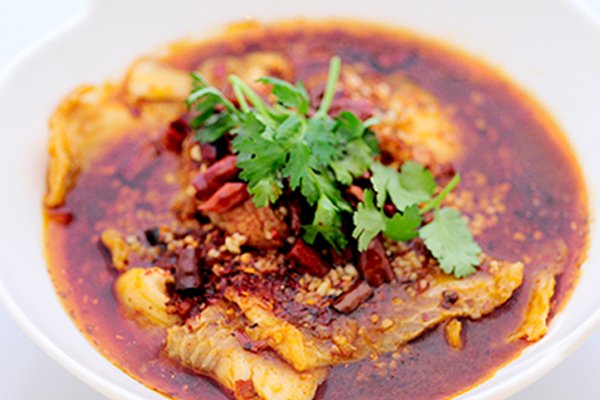Si Chuan Dou Hua
by Qian Leung
@ 30 Jun 2017

At Si Chuan Dou Hua on Kitchener Road, 57-year-old Hong Kong Chef Cheng Kwong Leung shares that he first fills the tummy of a duck with sandy ginger dust, gold grass dust, cilantro powder, celery powder, salt, sugar, ginger, spring onions, garlic, bay leaf, star anise, suckling pig sauce, and Hua Diao jiu (Chinese rice wine). He sews up the opening with kitchen thread, and turns the duck over after half an hour for it to marinade evenly.
After another half an hour, it is ready to be wind-dried, for about three hours. Chef Cheng checks the charcoal used and has it lit and smoke-free. During the first 20 minutes, you don’t need a very big fire. “Whether you are barbecuing pork or roasting a duck, what’s important is the same,” says Chef Cheng. “During the last ten minutes, you need to get a good, roaring fire.” Usually, the roast ducks are set with a metal rod is used to turn the ducks, bellies facing the fire for the first 20 minutes. Then, a metal rod is used to turn the ducks, bellies facing the fire, for the last ten minutes. “This way, its skin would crisp, and the meat is actually more tender.” When the roast duck is done, he cuts the kitchen thread and lets the juices run out into a saucepan.
Some fish stock is added, and this flavourful gravy is then served together with the roast duck. Although some guests prefer the gravy served separately, Chef Cheng assures you that the roast duck skin would still remain crispy for about 20 minutes, even if it served with the gravy, and that it tastes even more delicious this way.
Each roast duck is about 2.2 to 2.3 kilogramme range, as he finds the roasted meat more tender. “In our line of work, the one thing needed is the willingness to put your heart, your soul, into what you are doing,” says Chef Cheng. “Sometimes the quality of the ducks we get is out of control. That’s when it takes your heart, your patience, to make it taste good.”
 At Si Chuan Dou Hua on Kitchener Road, 57-year-old Hong Kong Chef Cheng Kwong Leung shares that he first fills the tummy of a duck with sandy ginger dust, gold grass dust, cilantro powder, celery powder, salt, sugar, ginger, spring onions, garlic, bay leaf, star anise, suckling pig sauce, and Hua Diao jiu (Chinese rice wine). He sews up the opening with kitchen thread, and turns the duck over after half an hour for it to marinade evenly.
At Si Chuan Dou Hua on Kitchener Road, 57-year-old Hong Kong Chef Cheng Kwong Leung shares that he first fills the tummy of a duck with sandy ginger dust, gold grass dust, cilantro powder, celery powder, salt, sugar, ginger, spring onions, garlic, bay leaf, star anise, suckling pig sauce, and Hua Diao jiu (Chinese rice wine). He sews up the opening with kitchen thread, and turns the duck over after half an hour for it to marinade evenly.